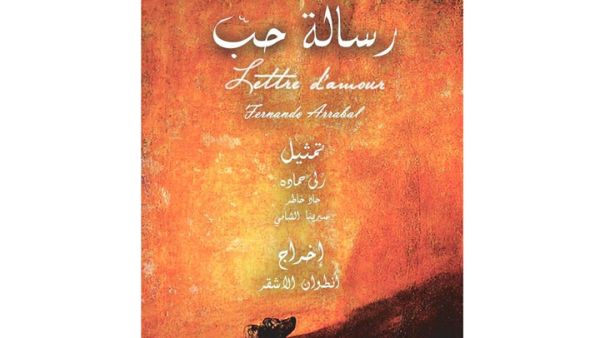Lebanese stage director Antoine Achkar fell in love with Spain many years ago. A fan of Spanish literature and theater, he was enamored of Fernando Arrabal’s “Lettre d’Amour” (Love Letter) and decided to translate the work into Arabic. This was the birth of Achkar’s project to adapt Arrabal’s text and bring it to Lebanon.
“Lettre d’Amour” will begin a string of performances at the Monnot Theater starting Monday. It tells the true story of the Spanish author, who found out that his father had been imprisoned because of his mother. This family crisis is set against a backdrop of the Spanish Civil War.
Achkar talked to The Daily Star about his theatrical project.
Q: Why did you choose to adapt Arrabal’s text?
A: The text is really touching – quite emotional with many poetic images. I had trouble translating it into Arabic because the images of a Western author come across differently when translated into Arabic. There are three main roles: the mother, the son and I added a feminine role at the end of the play.
Q: Can you elaborate on the plot?
A: The play is about a mother who is waiting for a letter from her son [Arrabal]. But I don’t know if this letter is metaphorical or real. The mother will be played by Roula Hamadeh, [the son by Jad Khater and the added role by Serena Chami.]
It’s the story of a family: a father, mother and son who were separated by the Spanish Civil War. The father was imprisoned because of his [unorthodox] political affiliations.
This is what the son found out when he was 14 years old, by reading letters – he knew his father was in jail because of his mother. From there the conflict [between mother and son] began. They used to have a passionate, almost incestuous relationship. Not truly incestuous though, but in the form it took it had some similarities. The mother waits for her son to contact her once again through a love letter. Hate and separation [prevail].
Q: Did you decide to adapt this text due to the parallels between the Spanish Civil War and the Lebanese one?
A: Whether in Lebanon, Spain or wherever, a civil war is a civil war. But even if the [guns] have stopped [shooting], it does not mean that the war has ended in the heads of the people, in their memories. This is what happened in the play and this is what is happening in Lebanon.
In my opinion, the Civil War hasn’t ended. Without sounding too philosophical, I think there is only one solution: the acceptance of the other.
It is a true story lived by the author, who never heard from his father after he disappeared after escaping the prison. But the mother is imprisoned as well – it is the prison of her memories, of this misunderstanding with her son. Her son never called her “mum” again.
Q: Will there be any additional effects, such as specific sound systems or video projections?
A: We will only have one projection, at the end of play, [consisting of] black-and-white images of the Spanish Civil War – paintings by Francisco Goya and Pablo Picasso’s “Guernica.”
I chose this venue because the play is really intimate and [filled] with strong emotions. We have to share these feelings with the audience. This is what I think as a stage director. When there is a play with deep emotions, we should not [put a large distance] between the actors and spectators.
“Lettre d’Amour” will be performed at Monnot Theater from Oct. 28 to Nov. 10. For more information, please call 01-202-422.








